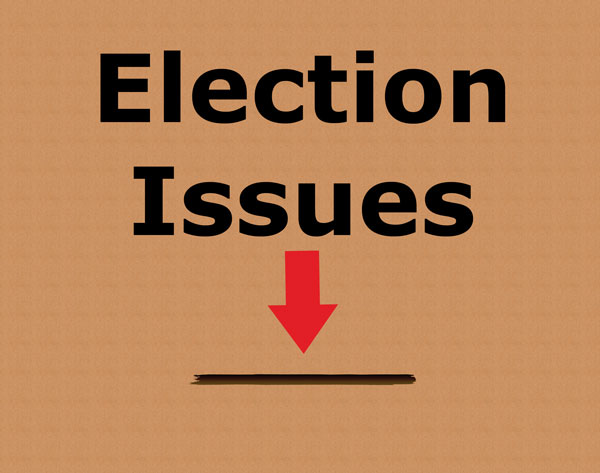With the federal election only a month away, many students have begun to form their own ideas of what the most important election issues are. The Fulcrum asked its contributors what issues they’ll be pondering at the ballot box.
Photo: Kim Wiens
Student Debt
The Green Party has recently released a 44-page election platform insisting they will ensure tuition-free education by 2020. This may seem ambitious considering the current standard of increasing tuition fees among most Canadian universities, with the exception of Newfoundland and Labrador, which only recently converted all provincial student loans to grants.
With the current unpromising labour market and state of youth unemployment, student voters should prioritize student debt in the upcoming elections. Student debt means that many are forced to pay back large amounts of debt when they should be focusing on getting their life started. According to the Canadian Federation of Students (CFS), “in 2010, the total amount of student loans owed to the government reached $15 billion, the legislated ceiling set by the Canada Student Financial Assistance Act.” The current government has also stepped up its collection of debts rather than continuing to pay off student debt according to the Canadian Broadcasting Company (CBC). The issue of student debt is particularly concerning to students in Ontario, who have the highest average debt load upon graduation, $28,000 according to the CFS. Although students should be considering the attention each party is giving to the eradication of student debt, they must also pay attention to how that will be achieved. A grants-based, rather than loan-based, education may seem overly ambitious, but increasing the limit of the current federal student loan debt only poses more problems for university students by allowing the creation of more student debt.
—Cassandra Richards
Science
There has never been a question about science at a federal leader’s debate, and all parties have less than stellar records on science, be it the Conservatives ruthlessly attacking public science, the Green Party’s policy on Canada’s biotechnology, or the NDP and the Liberals almost ignoring the issue entirely. All of this hurts students the most. It hurts students because we have our whole future ahead of us, and we want a future that is an improvement on today. This can’t be accomplished without innovation and discovery. We need technology to keep the environment clean, as well as make our consumption of resources more efficient and renewable.We need a government that will embrace the potential that technology offers in changing government outreach and policy. Technology can help our society deal with the burden of an aging population, while also creating new jobs and boosting the economy. Public universities serve as important contributors to advancements in science because they employ so many scientists and researchers. Science is a prime field for students to shine, since technological change is driven by younger people with new ideas. Students need a government that will focus on promoting and implementing scientific growth.
—Nicholas Robinson
Pensions
The issue of Canada Pension Plan (CPP) reform is on the table during this year’s election campaign as parties try to court votes from seniors. The Conservatives stand on one side, rejecting reform because they believe that an expanded CPP would be unsustainable. On the other side stand the New Democrats, the Liberals, and the Greens. The NDP support a lowering of the retirement age from 67 back to 65 years old, while the Liberals have also supported lowering of the retirement age as well as increasing the Guaranteed Income Supplement by ten per cent. Most students are a long way from cashing in our CPPs, so why should we care about pensions in this election? First of all, if you’re over the age of 18, living outside of Quebec, and earning more than $3,500 per year, you’re contributing to the CPP. Based on your income you’re contributing between $175 and $2,500 per year. Changes to the CPP may affect how much you contribute, and how your money is put to use. Pensions not only impact our taxes, but also our employment opportunities. If the CPP and other benefits don’t provide enough incentive to retire, Canadian seniors may continue to work past 65 in order to earn more. For younger generations, this may mean even less access to unionized positions that operate on seniority, as workers stay with an organization form more time. We may not be the target audience for pension platforms, but it is our issue as much as any other, and we shouldn’t ignore it when we go to the polls this October.
—Manuela Haemmerli
Security
Whichever party wins the election will have to carefully navigate the line between providing security in a digital and global age, and respecting the rights of all their citizens. The hotly debated Bill C-51 is a prime example of the need for clarity. Introduced by the Conservatives and supported by the Liberals (who say they’ll amend the bill to include more government oversight), this piece of legislation aims to enhance different forms of law enforcements’ abilities to combat terrorism. It allows the arrest of subjects if authorities believe the arrest is likely to prevent an attack, rather than be necessary to stop an attack. The new bill also allows the arrest of people who advocate that terrorist acts be carried out, but doesn’t define what constitutes a terrorist act. Bill C-51 also gives judges the power to have anything they feel fits the definition of terrorist propaganda removed from the Internet. Bill C-51 garnered international and domestic criticism with Amnesty International saying that parts of the anti-terror law are so vague that they could be used to target Aboriginal or environmental protesters in Canada. Other political parties in Canada have expressed support for the creation of a government committee to oversee the work being done by security agencies to ensure they’re not infringing on the rights of Canadians. The current government not only increased the powers of security agencies but is also planning on pushing through a travel ban that would limit the countries that Canadians are able to travel to. Canadians who travel to some regions in certain countries where terrorist groups are “recruiting and training followers” according to the Conservative Party website, would be asked to prove they have a legitimate reason for the trip, meaning they would be guilty until proven innocent. While there is clearly a risk of people travelling to certain countries rife with violence this approach is so broad that it’s bound to affect more innocent Canadians than catch criminals.
—David Campion-Smith





